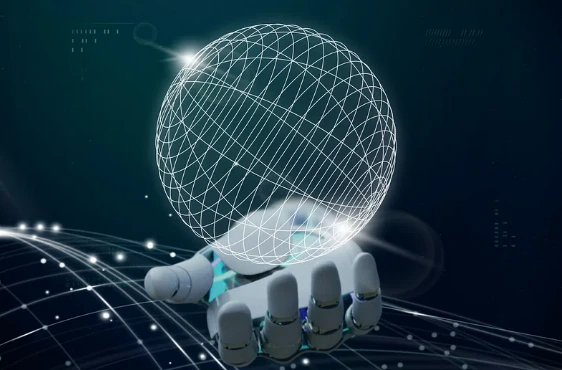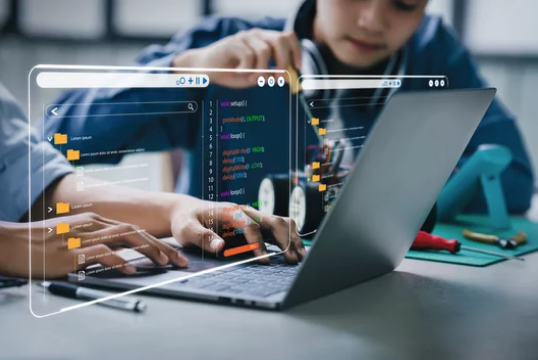Artificial Intelligence in Education
In the dynamic landscape of education, where the needs of learners and the demands of society are ever-evolving, the integration of Artificial Intelligence (AI) emerges as a transformative force. From personalized learning experiences to advanced administrative tools, AI is reshaping every facet of education.
Using AI in Education
We'll take a look into the intricate ways AI is reshaping education, from personalized learning to executive education, with a focus on its current applications, potential impact, & challenges, and explore the immense possibilities AI brings to the forefront of EdTech.

Personalized Learning with AI
One of the most promising aspects of AI in education is its ability to deliver personalized learning experiences tailored to the unique needs and preferences of individual learners.Traditional education systems often struggle to accommodate the diverse learning styles and paces of students. However, AI-powered platforms can analyze vast amounts of data, including students' performance metrics, learning preferences, and even socio-emotional factors, to create personalized learning pathways.
Through adaptive algorithms, AI platforms can dynamically adjust content delivery, pacing, and difficulty levels to optimize learning outcomes for each student. For example, a student struggling with a particular concept may receive targeted remedial exercises, while an advanced learner could be presented with more challenging material to foster continued growth. By harnessing the power of AI, educators can transcend one-size-fits-all approaches and unlock the full potential of every student.
1. Adaptive Learning Platforms - AI-powered systems like Knewton and Carnegie Learning use machine learning algorithms to analyze students' learning patterns, strengths, and weaknesses in real-time. These platforms adjust the difficulty level, pacing, and content delivery to match each student's unique needs. Here's how AI is changing this:
2. Intelligent Tutoring Systems - Companies like Third Space Learning are using AI to provide one-on-one tutoring experiences. These systems can identify knowledge gaps, offer targeted explanations, and provide instant feedback, mimicking the benefits of human tutors at scale.
3. Emotional AI - Emerging technologies are exploring the use of facial recognition and natural language processing to detect students' emotional states during learning. This could help educators identify and address engagement issues or learning difficulties more effectively.
AI in EdTech
The intersection of AI and educational technology, commonly referred to as EdTech, represents a burgeoning field ripe with innovation and promise. From intelligent tutoring systems to virtual classrooms, AI-driven tools are revolutionizing the way students learn and teachers instruct. EdTech startups and established players alike are harnessing AI to develop interactive, immersive, and engaging learning experiences that transcend the limitations of traditional classroom settings.
One notable example of AI in EdTech is the rise of intelligent tutoring systems (ITS), which leverage machine learning algorithms to deliver personalized instruction in real-time. These systems can adapt to individual student responses, provide immediate feedback, and offer targeted interventions to address areas of weakness. By combining the scalability of technology with the efficacy of personalized learning, ITS holds immense potential to improve learning outcomes across diverse educational contexts.AI-Powered Educational Tools and Platforms
The EdTech sector is witnessing a surge in AI-driven innovations:Smart Content Creation - AI tools like Cram101 and JustTheFacts101 are automating the creation of study guides, chapter summaries, and practice tests from textbooks, making learning materials more accessible and digestible.
Automated Grading - Platforms like Gradescope use AI to streamline the grading process for assignments and exams, particularly beneficial for large classes or MOOCs (Massive Open Online Courses).
Virtual Reality and Augmented Reality - AI is enhancing VR and AR educational experiences, creating immersive learning environments that adapt to student interactions in real-time.
AI in education isn't just about teaching machines; it's about empowering minds, transforming futures, and unlocking the full potential of every learner.
Using AI in Education
The integration of AI across various facets of education extends beyond the classroom to encompass administrative tasks, curriculum development, and even student support services.
For instance, AI-powered chatbots can automate routine administrative processes, such as enrollment, scheduling, and grading, freeing up educators to focus on more value-added activities.

AI-driven analytics platforms can analyze student performance data to identify trends, predict future outcomes, and inform instructional decision-making.
AI holds promise in enhancing accessibility and inclusivity in education by providing adaptive solutions for students with diverse learning needs.
For example, natural language processing (NLP) algorithms can enable real-time captioning and translation services for students with hearing impairments or limited English proficiency. AI-driven content recommendation systems can curate educational resources that align with students' interests, abilities, and cultural backgrounds, fostering a more inclusive learning environment for all.
By harnessing the power of AI in education, institutions can streamline administrative processes, optimize resource allocation, and ultimately, cultivate a more efficient and effective learning ecosystem.
AI in Educational Administration
Beyond the classroom, AI is streamlining administrative tasks:Predictive Analytics - Universities are using AI to predict student performance and identify at-risk students early. For instance, Georgia State University's AI system has helped increase its graduation rate by 30% over the past decade.
Chatbots for Student Support - AI-powered chatbots like Jill Watson at Georgia Tech provide 24/7 support to students, answering queries about course content, deadlines, and administrative procedures.
Enrollment Management - AI algorithms are being used to optimize student recruitment and admissions processes, helping institutions identify the best-fit candidates and predict enrollment trends.
Executive Education and Artificial Intelligence
AI is reshaping professional development by offering tailored, data-driven learning experiences for corporate leaders and industry professionals.

Recognizing the need to upskill and reskill in the face of rapid technological advancements, organizations are increasingly turning to AI-powered platforms to deliver targeted training programs that address specific competency gaps and strategic priorities.
AI-driven learning platforms can analyze individual skill profiles, career aspirations, and organizational objectives to recommend personalized learning pathways for executives.
These pathways may include a combination of interactive modules, virtual simulations, and peer collaboration opportunities designed to develop critical competencies such as data literacy, strategic foresight, and innovation management. By leveraging AI in executive education, organizations can ensure that their leaders remain agile, adaptive, and well-equipped to navigate an ever-changing business landscape.
Challenges and Ethical Considerations
While the potential of AI in education is immense, it's not without challenges:Data Privacy - The collection and use of student data raise significant privacy concerns. Striking a balance between personalization and data protection is crucial.
Equity and Access - There's a risk that AI-powered education could exacerbate existing inequalities if not implemented thoughtfully. Ensuring equal access to AI-enhanced learning tools is a critical challenge.
Teacher Training - For AI to be effectively integrated into education, significant investment in teacher training and professional development is necessary.
Overreliance on Technology There's a concern that overreliance on AI could diminish critical thinking skills and human interaction in education.
The Future of AI in Education
Looking ahead, we can expect AI to play an even more significant role in education:Lifelong Learning - AI will facilitate personalized, continuous learning experiences that adapt to changing career needs throughout an individual's life.
Global Classrooms - AI-powered translation tools could break down language barriers, enabling truly global classrooms and collaborative learning experiences.
AI as a Learning Companion - Advanced AI systems could serve as personal learning companions, providing support, motivation, and guidance throughout a student's educational journey.
AI Uses in Education - Moving Forward
As we navigate the complexities of the 21st-century knowledge economy, the role of AI in education becomes increasingly indispensable. While AI in education is still in its early stages, its potential to transform learning experiences, improve educational outcomes, and increase access to quality education is immense. From personalized learning experiences to AI-driven EdTech solutions, the potential of AI to transform teaching and learning is vast and multifaceted.
As we navigate this AI-powered educational revolution, it's crucial to approach its implementation thoughtfully, addressing challenges and ethical concerns while harnessing its transformative power. By embracing AI-powered innovations, educators, policymakers, and industry leaders can unlock new opportunities to enhance learning outcomes, foster inclusivity, and empower individuals to thrive in a rapidly evolving world. The future of education is undoubtedly intertwined with AI, promising a more personalized, efficient, and inclusive learning experience for all.
Machine Learning Artificial Intelligence News
https://machinelearningartificialintelligence.com
AI & ML



Sign Up for Our Newsletter